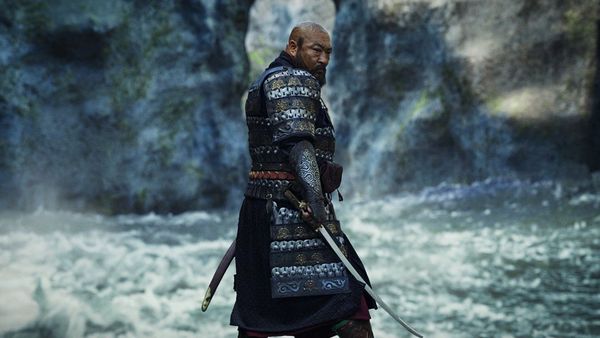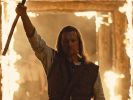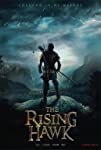Eye For Film >> Movies >> The Rising Hawk (2019) Film Review
The Rising Hawk
Reviewed by: Jennie Kermode

Ukraine produces around 35 films a year. Most of these are small scale dramas; action films are rare. Taking on an epic story like that of Zakhar Berkut with a big budget and an international cast is ambitious indeed. A huge hit on release there last year, the film, renamed The Rising Hawk, is now about to be released internationally, but it's a very different experience if you don't have the same cultural background and sense of national pride - so how does it translate?
Whilst it's billed as a historical epic based on real events, it's important to understand that the latter description applies only in a loose sense. The film was already been attacked for inaccuracy, which is not altogether fair - like its Scottish counterpart Braveheart, it's actually adapted from a historical novel - Ivan Franko's Zakhar Berkut, previously filmed by Leonid Osyka in 1972 - which acknowledged that it was taking a few liberties for the sake of reader engagement. The book is well known to Ukrainians and has itself distorted many people's perception of the past, but the basics of the events it depicts, if not the characters involved, were real enough.

Central to the book its its title character, 90 years old but still formidable in combat. Here he's played by Robert Patrick, who looks nowhere near that age but fits into the role of patriarch well enough. Partnered by his wife Rada (Alison Doody), who doesn't fight but seems every bit as significant as a political decision-maker, he leads a small band of 13th Century highlanders who live a peaceful life in the Carpathians until Mongol general Burunda Khan (Tserenbold Tsegmid) decides to annex their territory. Unable to fight back on their own, they seek an alliance with powerful local boyar Tuhar Vovk (Tommy Flanagan), but despite the boyar seeing some sense in the arrangement, this proves to be more complicated than expected.
These are a people who live in wild country, surrounded by dangerous animals. There's a bit of artistic exaggeration here, rooted in the book's use of folklore to embellish its historical setting. In an early scene, Berkut's son Maksym (Alex MacNicoll) and Vovk's daughter Myroslava (Poppy Drayton) are caught up in an encounter with a bear of unusual size. The next thing you know, Maksym is sneaking into her bedroom to invite her to a dance. Needless to say, this teen love affair does not meet with the boyar's approval - Maksym may be a chief's son but he's really little more than a peasant. As war breaks out around them, the young couple - here brought to the fore - must decide where their priorities really lie.
Like Scotland's Braveheart fans, most Ukrainians don't seem to take issue with the fact that their national (albeit fictional) hero is played by a foreigner; neither do they mind that the film is shot in English (with the exception of some unsubtitled Mongolian scenes which are easy enough to follow). Alongside US and UK stars, the film includes native Ukrainians, plus Kazakhs and Mongols. Cast aside it is, at a creative level, a wholly Ukrainian production, with the US merely contributing finance. There's a different energy amongst those cast members who have grown up with the story and, given the local prestige of the film, there's impressive talent among their ranks. Patrick aside, the US and UK actors don't quite have the same presence, but when we set aside politics and romance to plunge into action, that doesn't much matter.
The fighting here is rough and realistic. There's a recognition - still too rare in cinema - then when one is fighting with a sword and one's life is on the line, the sword is only one of the weapons one might use - kicks, punches, headbutts and so on are just as important. Although there's not much emphasis on gore, nothing here has been prettified. The scene with the bear has a distance, fairy tale quality, but later fights are scrappy and ugly as they ought to be, and there are a couple of spectacular set pieces.
The problem at the heart of all this is that this was a film made for audiences already invested in Berkut and his cause. Little effort is made to introduce either, let alone to make viewers connect with them, which means that international audiences have no obvious emotional route into the story. Yes, one might instinctively side with the underdog, knowing the might of the Mongol horde, and one might root for the lovers, but in light of the slow build-up before the war gets going, that isn't really enough. And the Mongols here are - to the film's credit - not simple monsters, with one interesting scene suggesting that they're actually struggling because of a perceived need to live up to the legacy of the great Genghis Khan.
Watch this on a big screen if you get the chance, and bear with it in the early stages. In a year when we have - for understandable reasons - been short on blockbusters, it delivers some satisfying visceral thrills. Add a star to this rating if you're Ukrainian. Don't expect something that sticks to known facts, but do expect something with spirit.
Reviewed on: 28 Sep 2020















